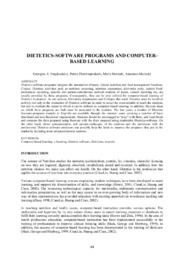| dc.contributor.author | Fragkiadakis, Georgios A. | en |
| dc.contributor.author | Dimitropoulakis, Petros | en |
| dc.contributor.author | Markaki, Maria | en |
| dc.contributor.author | Markaki, Anastasia | en |
| dc.coverage.spatial | CY - Λευκωσία | en |
| dc.creator | Fragkiadakis, Georgios A. | en |
| dc.creator | Dimitropoulakis, Petros | en |
| dc.creator | Markaki, Maria | en |
| dc.creator | Markaki, Anastasia | en |
| dc.date.accessioned | 2016-01-28T10:42:17Z | |
| dc.date.available | 2016-01-28T10:42:17Z | |
| dc.date.issued | 2007 | |
| dc.identifier.uri | http://hdl.handle.net/10797/14534 | en |
| dc.description | Περιέχει το πλήρες κείμενο | el |
| dc.description.abstract | Dietetics-software programs integrate the automation of many clinical nutrition and food-management functions.
Clinical Dietetics activities such as nutrition screening, nutrition assessment, diet-order entry, patient foodpreferences
recording, specific diet pattern-calculations, nutrient analysis of meals, consult reporting etc, are
usually provided by these programs. Consequently, they can be also utilized for computer-based learning of
Dietetics in practice. In our opinion, University departments and Colleges that teach Dietetics must be involved
actively not only in the evaluation of Dietetics software in order to select the most suitable to teach the students,
but also to evaluate the extent to which it can be utilized on computer-based learning. In addition, the core ideas
on which these programs are built must be presented to the students. The last years, a number of Dietetics
freeware-programs (mainly in English) are available through the internet; some covering a number of basic
functional and non-functional requirements. Students should be encouraged to “play” with them, add local foods
and compare the diets prepared using freeware with the diets prepared using marketable Dietetics-software. On
the other hand, direct communication and opinion-exchanges of the students and the professors with the
professional Dietetics-software producers can possibly help the latter to improve the programs they put in the
market by including more advanced tutorial sections. | en |
| dc.language.iso | eng | en |
| dc.publisher | University of Cyprus | en |
| dc.relation.ispartof | Computer based learning | en |
| dc.rights | info:eu-repo/semantics/openAccess | en |
| dc.rights | Open Access | en |
| dc.source | CBLIS Conference Proceedings 2007 Contemporary Perspective on new technologies in science and education | en |
| dc.title | Dietetics-software programs and computerbased Learning | en |
| dc.type | info:eu-repo/semantics/conferenceObject | en |
| dc.subject.uncontrolledterm | Computer-based learning | en |
| dc.subject.uncontrolledterm | e-learning | en |
| dc.subject.uncontrolledterm | Dietetics software | en |
| dc.subject.uncontrolledterm | Dieticians | en |
| dc.subject.uncontrolledterm | Tutorials | en |
| dc.contributor.conferenceorganizer | Learning in Science Group, University of Cyprus | en |
| dc.contributor.coordinator | Constantinou, Constantinos P. | en |
